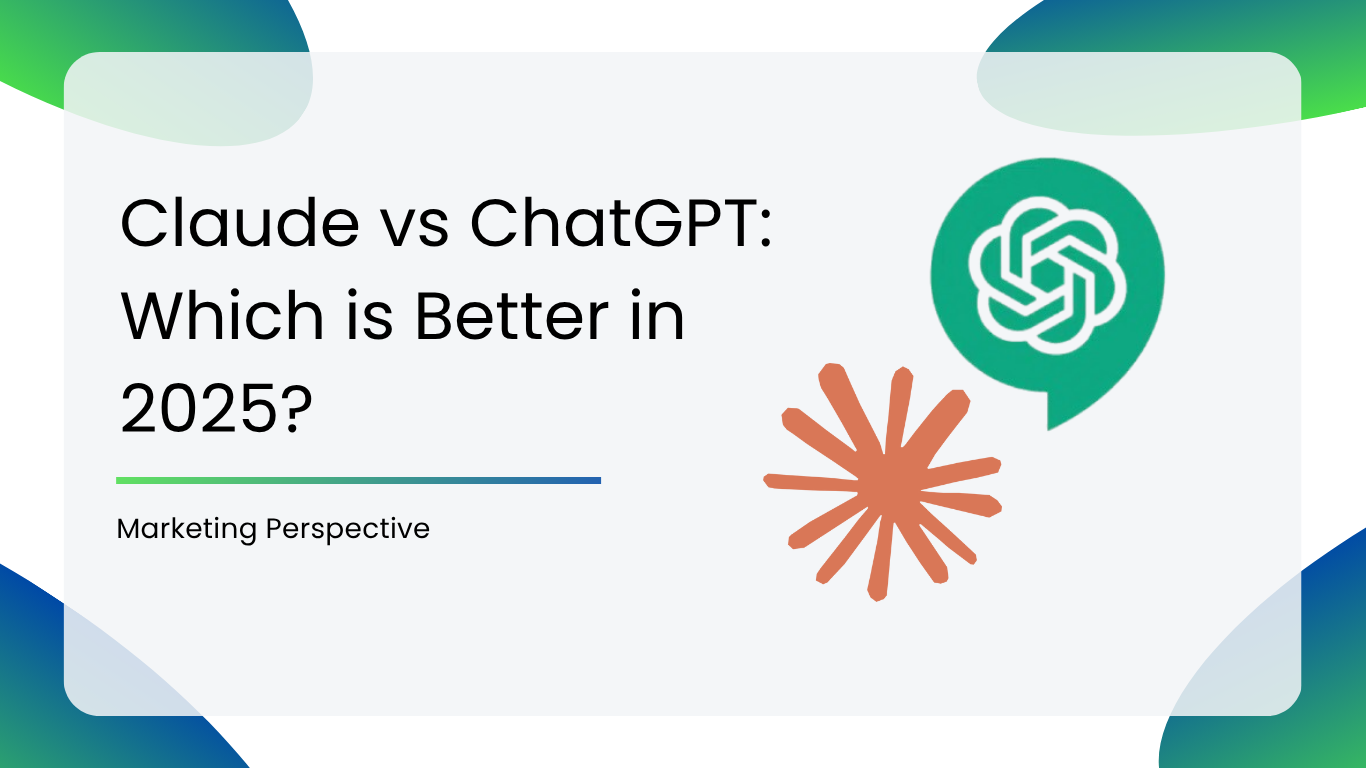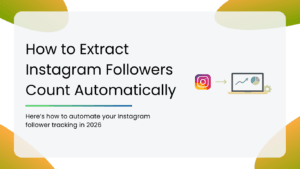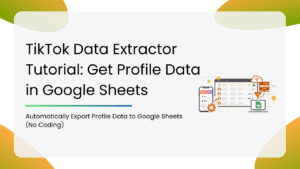AI has come a long way, and if you’re a marketer, you’ve definitely felt the shift. From drafting copy to analyzing campaign data, today’s AI tools are like having a creative assistant, data analyst, and strategist all rolled into one.
But with so many tools out there, one question keeps popping up: Claude or ChatGPT?
Both are powerful, both are smart, and both have evolved fast. But if you’re wondering which AI space deserves a place in your marketing toolkit, you’re in the right place. Let’s break it down!
Claude vs ChatGPT at a Glance
Here’s a side-by-side comparison from a marketer’s point of view:
| Feature | Claude (Anthropic) | ChatGPT (OpenAI) |
| Tone & Output Style | Polished, formal, great for brand-safe content | Flexible, witty, and tone-adaptable (great for social & ad copy) |
| Content Creation | Strong at long-form, FAQs, and emails | Great at catchy headlines, scripts, and dynamic storytelling |
| Data Handling | Handles large context windows (great for briefs or full receipts) | Super-fast and great at summarizing multiple data inputs |
| SEO Support | Good at structured outlines, meta content, and keyword suggestions | Stronger at SEO-friendly rewrites and content variations |
| Pricing (as of 2025) | $17/month | $20/month |
| Best Use Case for Marketers | Customer support flows, internal docs, email drafts | Social captions, ad copy, content ideas, quick edits |
Same prompt, different tones
Content Creation & Copywriting
When it comes to creating content that actually sounds human, both Claude and ChatGPT know their way around words. But they excel in different ways, especially when you’re trying to strike the right tone, match your brand’s voice, or produce scroll-stopping copy.
Writing Tone & Fluency
Claude is clean, formal, and highly structured. The platform is perfect for emails, internal docs, and brand-safe messaging.
ChatGPT is great at tone-switching. Witty, punchy, poetic, or plain, it adapts to whatever your audience needs. ChatGPT can effortlessly create social media captions, landing page hooks, campaign taglines, etc., in no time.
Brand Voice Adaptability
Both tools can mimic brand tone, but ChatGPT edges ahead here. You can feed it your past campaigns, guidelines, or even just the vibe, and it’ll match the voice near-perfectly.
Claude keeps it steady and professional, but might need more prompting to get the tone a little easier.
Editing, Rewriting, and Tone-Shifting
Claude is perfect at rewriting long pieces like reports, FAQ sections, or adjusting tone in client communications. It’s methodical and consistent.
ChatGPT feels faster and more playful with rewrites. If you want three versions of your email with different tones, or a sensational version of that headline, you’ll get creative options within seconds.
How each tool handles tone-shifting across different brand voices
Styles (Claude) vs Canvas (ChatGPT)
Claude’s ‘Styles’ vs ChatGPT’s ‘Canvas’
In 2025, both tools offer “custom modes.” Claude uses Styles (like formal, friendly, balanced), while ChatGPT users get access to Canvas, an intuitive space to build, tweak, and collaborate on content.
Choose:
- Claude for clean, polished writing that leans professional
- ChatGPT, when you want fun, bold, and brand-flexible copy.
Visual Content & Media Capabilities
As marketing shifts more and more toward visual-first content, having an AI that can brainstorm and build assets is a game-changer. So, how do Claude and ChatGPT compare when it comes to visuals?
ChatGPT’s Image & Video Generation (DALL·E + Sora)
This is where ChatGPT really flexes. Product mockup, stylized event invite, quick visual to test your visual ads: ChatGPT + DALL·E delivers. And with Sora, you can even generate short video concepts, moodboard clips, or animated explainers that align with your campaign idea. It’s fast, fun, and surprisingly professional-looking.
Image generation with ChatGPT (DALL·E)
Claude’s Limitations (No Visuals Yet)
Claude keeps things strictly text-based. It’s excellent with descriptions, concept writing, or scripting for videos, but you’ll need a separate tool for any image or video generation. If your workflow is visual-heavy, this could feel like an extra step.
When Visuals are Core to Your Campaigns
If your team is working on ad creatives, carousels, or explainer reels on the regular, ChatGPT takes the lead here. The ability to ideate and generate visuals in one place is a huge time-saver, especially when you’re on tight deadlines or testing multiple variations.
Choose:
- ChatGPT, when your campaign needs images, mockups, short videos, alongside copy
- Claude, when visuals aren’t the focus, and your content is more word-driven.
Marketing Automation & Workflow Integration
The real win isn’t just what AI can write, but how well it fits your daily workflow. Here’s how Claude and ChatGPT compare when it comes to getting things done behind the scenes.
Zapier Integrations & Beyond
If automation is your thing, ChatGPT makes the work easier for you. With Zapier integrations, you can connect it to tools like Notion, Google Sheets, Slack, HubSpot, and more.
Claude isn’t quite there. It doesn’t offer Zapier integrations, which means it’s a better fit for manual prompts, not automated workflows. It’ll break down complex workflows and even help write scripts. But it can’t execute them for you through native integrations.
ChatGPT + Zapier = hands-off marketing automation
Custom GPTs = Custom Workflows
You can train your own version of ChatGPT to handle specific tasks, like writing product descriptions in your brand voice, or automatically responding to FAQs in your support inbox.
Recurring Tasks, Scheduling & Bots
Want AI to check your campaign data every Monday, or generate a social content draft every Friday afternoon? ChatGPT can do that, especially when paired with scheduling tools or third-party bots. For marketers juggling multiple channels, this means less work and more strategy time.
Claude takes a simpler route. It’s great for when you want to sit down, type a request, and get something polished. You just need to set up systems manually.
Choose:
- ChatGPT, if you want to integrate, automate, and scale
- Claude, if you want high-quality output, but you’ll be triggering it manually each time
Campaign Ideation & Strategy
Whether you’re crafting a high-level strategy or just need ten killer taglines by lunch, both Claude and ChatGPT bring something valuable to the brainstorming table.
Claude for Thoughtful, In-Depth Ideation
Claude is great when you need structured, well-reasoned suggestions, like planning out a customer lifecycle journey, writing detailed campaign briefs, or developing email flows that don’t feel robotic. It asks the right questions, builds logical narratives, and gives you a full picture instead of just punchlines.
ChatGPT for Rapid-Fire Brainstorming
ChatGPT is especially strong when you need creative angles fast, for A/B testing headlines, playing with CTAs, or coming up with campaign names that don’t sound like everyone else’s. It can even match the tone of the platform.
Use Case Examples
| Task | Claude | ChatGPT |
| Campaign Ideas | Long-term strategies, educational funnels, user journeys | Themed activations, viral challenges, seasonal spins |
| Hooks & Angles | Thought-led intros, emotionally grounded messaging | Snappy one-liners, punchy openers, meme-style copy |
| Taglines | Brand-safe, poetic, mission-aligned | Bold, edgy, scroll-stopping |
Ideation styles from ChatGPT and Claude
Choose:
- Claude, when you need depth, strategy, and clear thinking
- ChatGPT, when speed, volume, and creativity are the name of the game
Code, Tools & Interactive Assets
Marketing isn’t just about writing and visuals anymore. From interactive quizzes to smart calculators and landing pages, today’s campaigns are increasingly powered by tools, not just words. So, which AI helps you bring these ideas to life?
Claude’s Artifacts
Claude introduced Artifacts, a clean way to generate and review usable content like landing page layouts, pricing calculators, or quiz templates. It’s not exactly like a full-blown development environment, but it’s super helpful when you want to sketch out interactive elements or web copy in context.
Say you’re building a gated calculator for lead gen, Claude can help you plan the logic, write the copy, and structure the HTML.
ChatGPT’s Canvas & Code Previews
With ChatGPT, you can build out mini web apps, prototype microsites, or customize email templates inside the interface. Whether it’s writing JavaScript or structuring a form, it delivers fast, functional snippets you can use right away.
It’s especially handy if you’re collaborating with designers or developers, you can mock things up and hand over something real, not just vague ideas.
Use Cases for Marketers
| Use Case | Claude | ChatGPT |
| Landing Pages | Drafts layout, call-to-actions | Builds full HTML/CSS with styling |
| Lead-Gen Tools | Maps logic and structure | Writes code for calculators, quizzes, forms |
| Microsites & Widgets | Great for planning flow | Great for building MVPs and functional prototypes |
Planning with Claude vs Prototyping with ChatGPT
Choose:
- Claude for structured planning and clean drafts
- ChatGPT for building and previewing actual tools
Pricing & Plans
So, how do Claude and ChatGPT compete in 2025 when it comes to affordability and value?
For Solo Marketers
Claude Pro: Offers a solid monthly plan that gives you access to Claude 3 Opus, its most advanced model. It’s best if your team leans toward long-form, research-heavy, or client-safe content. Pricing sits around $17/month mark.
ChatGPT Plus/Pro: With ChatGPT-4o included in the $20/month Plus plan, it’s a steal if you’re creating high-volume content, testing tone options, or need visuals. It also includes image generation and access to Sora (video), which adds a lot of value if you’re mixing formats.
For Teams
Claude for Teams: It is enterprise-friendly with a focus on security, compliance, and data privacy. Team plans are customizable and priced accordingly, best suited for structured, collaborative content like docs, playbooks, and workflows.
ChatGPT for Teams: It is built with shared custom GPTs, collaborative Canvas workspaces, and seamless API + Zapier integration. The platform is a great option for marketing teams that need rapid iteration and creative flexibility across projects.
API Pricing Comparison
If you’re looking to integrate AI directly into your stack:
Claude API (Anthropic): Billings tends to run a bit higher, especially if you’re using the Opus model. However, it handles longer inputs and deeper context, so it can be more cost-effective for research-heavy tasks.
ChatGPT API (OpenAI): More budget-friendly for high-volume tasks, especially if you’re running automations, A/B testing content, or generating lots of short-form content.
Best Value? It Depends.
| Use Case | Best Option |
| Long-form, in-depth strategy docs | Claude |
| High-volume social content, variations, creatives | ChatGPT |
| Team collaboration on creative projects | ChatGPT |
| Client-safe content in regulated industries | Claude |
| Building tools and interactive content | ChatGPT |
Choose:
- Claude, when you need depth and structure
- ChatGPT, when you need creativity, volume, and speed
Final Verdict: Claude or ChatGPT
So, Claude vs ChatGPT in 2025. Which one wins?
Honestly? It’s not a battle, it’s a balance. Both tools are incredibly powerful, just in different ways. The real win is knowing which one to use and when.
Use Claude if:
- You need structured content
- You’re focused on data privacy or enterprise-grade work
- You prefer deep, thoughtful ideation with fewer revisions
- You value a minimalist interface with strong output and fewer distractions
Use ChatGPT if:
- You need high-volume content
- Your work involves visuals, videos, or interactive tools
- You love experimenting with tone, voice, and formats
- You want to build custom GPTs or integrate AI into your workflows
Why You Might Need Both
The truth is, a hybrid AI stack is a marketer’s dream setup. Use Claude when you’re planning your strategy, crafting polished copy, or building foundational docs. Use ChatGPT when you’re generating ideas, designing creatives, or executing at scale.
Together, they cover the full spectrum: strategy, execution, and optimization.
In a world where content is prime and speed is everything, AI is your marketing edge.
Whether you’re team Claude, team ChatGPT, or smart enough to use both, the key is knowing how to make these tools work for you. So, go ahead and experiment, mix, match, and find your perfect AI workflow.
At Smacient, we’re constantly exploring how AI is transforming marketing. Dive into our latest blogs and stay ahead of the curve:
- Best Shopify AI Tools To Grow Your Store in 2025
- Best Proxies for Rank Tracking & SERP Analysis
- Top AI Tools for Google Sheets in 2025
FAQs
Both tools have powered real marketing content. Claude has been favored by teams who deep-dive email workflows, while ChatGPT’s Canvas and custom GPTs are being used to mock up campaign visuals, write influencer briefs, and simulate entire funnels. Brands in SaaS, ecommerce, and even D2C wellness have used these tools for everything from ad copy to strategy maps.
For SEO-heavy blog writing, Claude tends to produce cleaner outlines, long-form coherence, and nuanced keyword use. For short-form social content (reels script, carousels, meme ideas), ChatGPT shines, especially with its rapid iterations and ability to mimic trending formats.
Claude performs well in regulated or technical spaces. It’s noticeably more cautious and articulate when handling niche terminology or compliance-sensitive phrasing. It’s a solid choice if you’re marketing in sectors like fintech, edtech, or healthtech and need professional polish.
OpenAI’s ChatGPT is aggressively expanding into visual, interactive, and plugin-based workflows. Claude by Anthropic, on the other hand, emphasizes safer, more nuanced AI that’s great for strategic or advisory use cases. Both are rolling out enterprise features and deeper integrations. So, expect faster, more tailored AI support for marketers in the coming year.





